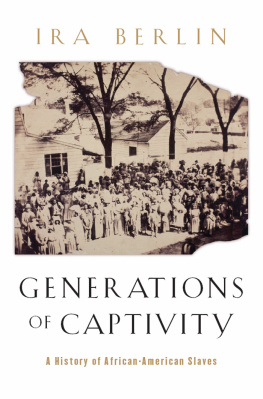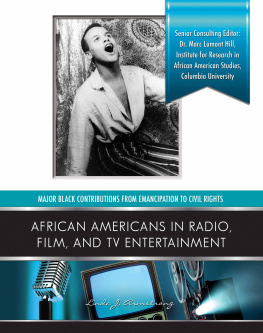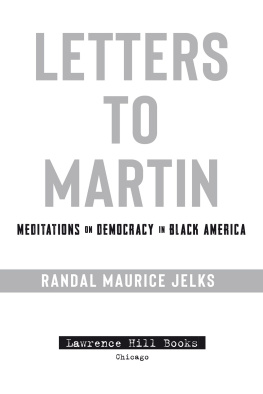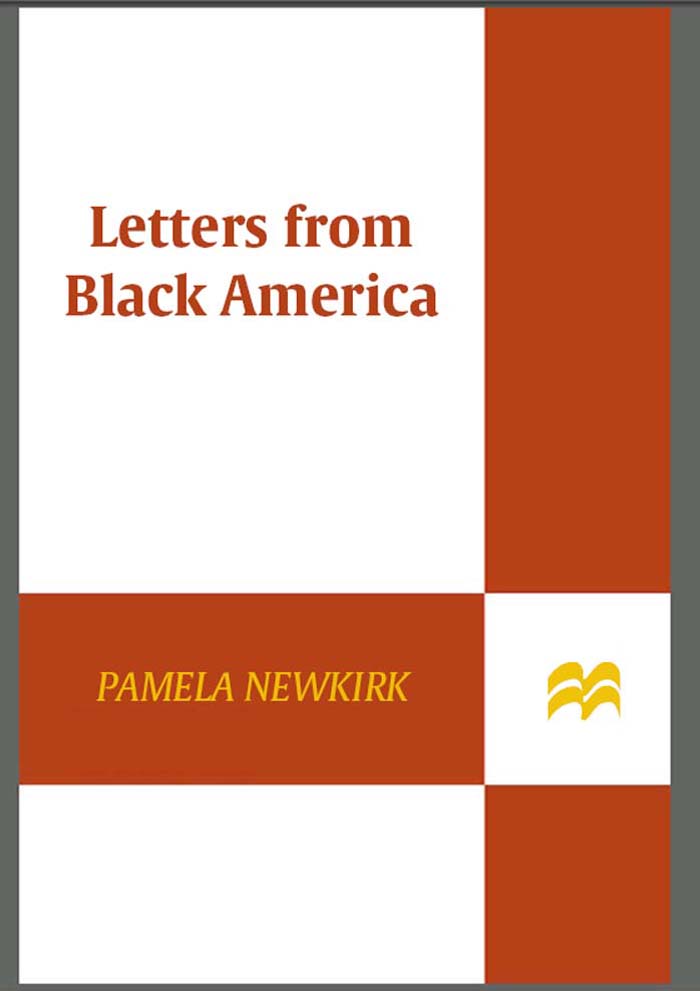ALSO BY PAMELA NEWKIRK
A Love No Less
Within the Veil: Black Journalists, White Media
Letters from Black America
Letters from Black America

Edited by
PAMELA NEWKIRK
Farrar, Straus and Giroux
New York
Farrar, Straus and Giroux
18 West 18th Street, New York 10011
Copyright 2009 by Pamela Newkirk
All rights reserved
Distributed in Canada by Douglas & McIntyre Ltd.
Printed in the United States of America
First edition, 2009
Owing to limitations of space, acknowledgments for permission to reprint previously published and unpublished material can be found starting on page 365.
Library of Congress Cataloging-in-Publication Data Letters from Black America/edited by Pamela Newkirk.1st ed.
p. cm.
Includes index.
ISBN-13: 9780-374-10109-1 (hardcover : alk. paper)
ISBN-10: 0374-10109-4 (hardcover : alk. paper)
1. African AmericansCorrespondence. 2. American lettersAfrican American authors. 3. African AmericansAttitudesSources. 4. African AmericansSocial conditionsSources. 5. African AmericansIntellectual lifeSources. 6. African AmericansPolitics and governmentSources. 7. African AmericansRace identitySources. I. Newkirk, Pamela.
E184.6.L49 2009
305.89607300922dc22
2008041265
Designed by Jonathan D. Lippincott
www.fsgbooks.com
1 3 5 7 9 10 8 6 4 2
To the memory of my mother
Contents
Introduction
T he popular enchantment with the art of letter writing can be traced back to the 1730s, when the poet Alexander Pope published his correspondence as literary works. Since then, hundreds of epistolary anthologies have been compiled, attesting to the enduring power of letters to satisfy our voyeuristic yearnings while animating and explicating facts. As linguistic snapshots of bygone eras, letters anchor us in the past with unparalleled intimacy and spontaneity, lighting the dark crevices of our private and public history. But despite their importance as historical markers and as literature, the letters of African Americanslike so much of Black historyhave historically been undervalued or ignored. Until recent decades, an African American epistolary tradition was considered an anomaly given the relatively low literacy rates during slavery and the century following Emancipation.
This collection is an attempt to help fill this literary and historical void by presenting a multidimensional portrait of African American life from the eighteenth to the twenty-first century through the illuminating letters of ordinary and exceptional African Americans. The correspondentsenslaved and free, powerless and privilegedexplore the social, religious, artistic, political, civic, and domestic lives of a people over the course of three centuries, providing a sweeping narrative history of the Black American experience.
The lettersparticularly those written before the latter part of the twentieth centuryprovide a stark contrast to todays rapid-fire correspondence facilitated by cell phones, PDAs, text messaging, and e-mail. While we have gained the ability to bridge our physical distances with the speed of light, we often write without the benefit of the quiet reflection that is evident in many of the letters contained here. Our gratification may be instant, but perusing these missives from the past invites us to contemplate what has been diminished in the name of velocity: the art of penmanship, the poetry of language, the enduring value of letters as historic objects, the sentimental connotations of a postmark and a loved ones handiwork, the contemplative act, and the anticipation and yearning tucked into an envelope.
While wide-ranging, this volume represents a mere fraction of the correspondence of African Americans deposited in archives or held in private collections. Many of the letters included here were selected from thousands culled from archives around the country, while others were unearthed through the African-American Life in Letters Project, launched in 2003. The project, initiated with a grant from the New York University Graduate School of Arts and Science fund and then sponsored by a New York University Research Challenge Fund grant, supported research and clerical assistance, travel, and a wide appeal through direct letters and e-mail to some of the most celebrated individuals in African American life. Outreach also involved Listserv announcements to civic organizations and veterans groups, lectures, newspaper notices, and word-of-mouth. The project was intended not only to prepare this volume but also to encourage the preservation of these important historical papers at archives. The Schomburg Center for Research in Black Culture agreed to serve as a repository for letters deemed historically significant and not cataloged elsewhere.
When I embarked on this project, I did not anticipate how difficult it would be to secure contemporary letters or to obtain permission to publish correspondence already deposited in archives. In retrospect, I appreciate the wish of contemporary correspondents to keep private what are, in fact, intimate artifacts. A history of disparaging portrayals in popular culture has surely contributed to the reluctance by African Americans to expose their inner lives. This reticence poses a challenge for scholars seeking to depict the fullness of African American life and makes all the more precious the contributors to these pages.
What emerges from the more than 200 letters in this volume is a textured, compelling, and unvarnished portrait of African American life that highlights our shared humanity. Laid bare are the public and private musings of some of the giants in American life: the letters of Rev. Dr. Martin Luther King, Jr., reveal both a romantic and a rebel; W.E.B. Du Bois shifts from a public intellectual impatient with the pace of progress to a doting father. We experience the pride of a father as his son goes to war, and the turmoil of a son explaining his decision to convert from the Christianity of his family to Buddhism. A gay activist poignantly describes his quest for acceptance, and young lovers revel in the poetry of their affections, with all its passion, pain, and pleasure.
It is my hope that this volume will contribute to the growing recognition of African American letters as historical treasures while inspiring those in possession of these irreplaceable relics to preserve themwhether in local or national archives, or in well-cared-for family librariesfor future generations.
See Janet Duitsman Cornelius, When I Can Read My Title Clear: Literacy, Slavery, and Religion in the Antebellum South (Columbia: University of South Carolina Press, 1991).
A Note on the text
While I have attempted to preserve the original texts as faithfully as possible, I have at times placed in brackets correct spelling or grammar, or contextual information, if they are needed to grasp fully the meaning of a letter. I particularly struggled with the letters written by barely literate slaves but in the end decided to allow the letters to retain their original character. I believe the poignancy of the writers plight overshadows their grammatical shortcomings. Unbracketed ellipses are the writers own, while those in brackets indicate the omission of passages that are immaterial to the essence of the letter or that contain personal information such as telephone numbers or addresses. In a few instances I have omitted passages to protect the privacy of one or both of the correspondents. I have, when the information is provided, indicated where and when the letter was written. When the date is not provided, I have, when possible, noted the date of the postmark.









